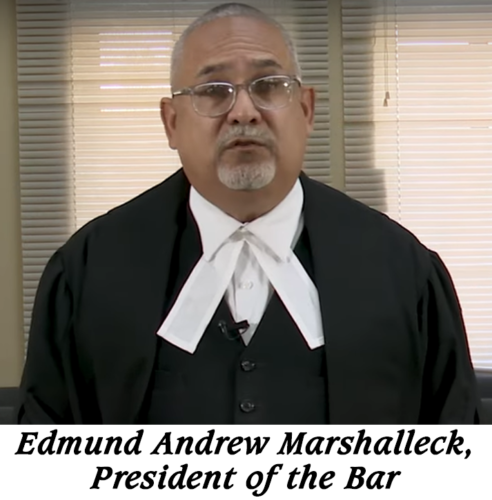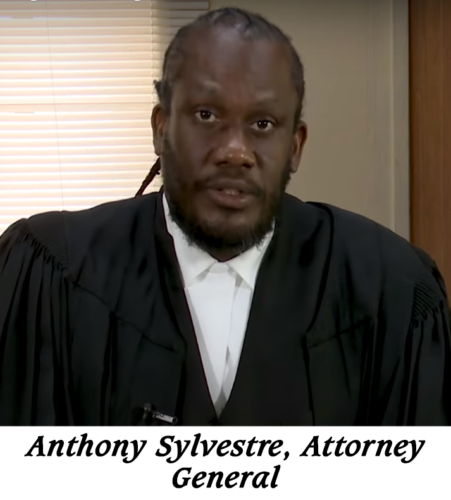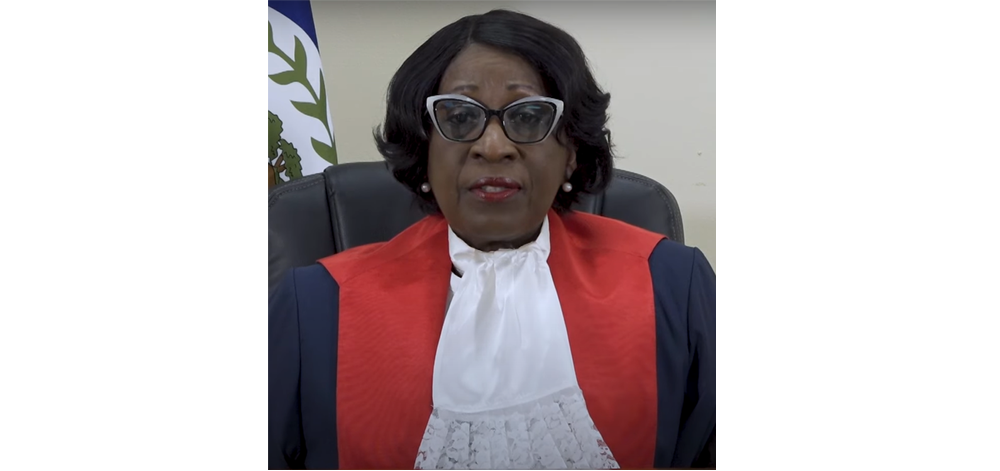Photo: Chief Justice, Hon. Madam Louise Esther Blenman
by Marco Lopez
BELIZE CITY, Wed. Jan. 17, 2024
The opening of the legal year is a tradition dating back to the Middle Ages. Judges in those times would attend a church service to pray for guidance in their deliverance of justice throughout the coming year. These days, the pomp and circumstance serves as a prelude to a series of sobering speeches on the state of the judiciary.
Madam Chief Justice Louise Blenman has been at the helm of the new Senior Courts of Belize for two years now. In her opening remarks, she lauded the reforms to the judiciary spearheaded by former Attorney General Magali Marin Young. Despite the progress, CJ Blenman noted that significant work must now continue to address major shortfalls that have long festered and fettered the effectiveness of the judiciary.
The “mountain of backlogged” cases presents significant impediments to providing timely, efficient, and effective access to justice, CJ Blenman said. This has resulted in what she described as “crippling morale” within the judiciary, which inevitably has spilled over to the public – equally crippling its confidence in the judiciary.
Dilapidated courtrooms and a less-than-efficient court registry have compounded these issues. Immediate measures to remedy these shortfalls were put in place, starting with a more robust case management process in both the criminal and civil divisions.
Secondly, the increased use of sentencing indicators was encouraged, and has led to the disposal of more criminal matters without trial. In addition to this, a more stringent adjournment policy has led to an increased number of trials and hearing dates in both divisions.
A focus on Alternative Dispute Resolution (ADR) is also being emphasized to reduce the caseload – especially within the civil division, where it is already widely used. Also, a policy of zero tolerance for long-standing judgments is in place. All judgments are now expected to be delivered within six months.
There was a high attrition rate in 2023, and the inability to attract quality judicial officers created difficulty in filling those vacant positions. CJ Blenman, in her remarks, noted that the government recognized this and took steps to improve the conditions of the judiciary, resulting in the courts being able to attract a full complement of suitable justices.
Since then, four additional judges have been added to the bench.
CJ Blenman outlined that the court formulated and implemented a three-year strategic plan to enhance judicial services. She shared that, once the courts are properly resourced, she is satisfied that the backlogged cases can be cleared within two years.
A full digitization of the Senior Courts will support these objectives, and the courts are aiming to roll out digitized systems within the first few months of 2024. In addition to this, a new website is being developed for the judiciary.
Of note, the first Judicial Education Institute in Belize was initiated to train and educate judicial staff within the legal year 2023.
Going back to the backlogs, CJ Blenman said that over the past year over 200 dormant ordinary claims were uncovered and disposed of. Judges are undergoing more rugged case management to filter their caseload and eliminate non-viable cases.
Most of the judges have succeeded in reducing their case load by 50%, CJ Blenman noted. The urgent need for more defense attorneys was highlighted as a significant obstacle, however.
“Justices of the criminal division are working assiduously to clear cases that are older than two years. They are hearing cases and delivering judgments in a timely fashion, but they cannot do it alone; both the prosecutions and the defense bar must play their part. There are too few lawyers at the defense bar, “CJ Blenman said.
The slow pace of justice delivery is reflected in the remand population at the Belize Central Prison, CJ Blenman went on to point out.
“I visited the Central Prison and noted that several young people are among detainees there. In Belize, it is not unusual for persons to have to wait in excess of 8 years for a trial. This is highly unsatisfactory, and is being addressed as a matter of priority,” she said.
The commitment of the judiciary now is to ensure that no case remains in the system longer than two years. The dormant cases identified were distributed among civil and criminal judges.
In the Court of Appeal, lack of transcripts and poor recording of High Court proceedings has led to the backlog. There is an urgent need for more stenographers and a need for a more efficient system to record proceedings in the High Court.
The courts are moving towards a paperless system, and additional administrative support within the registry and IT section will be important for an effective rollout.

From the Bar
President of the Bar Association of Belize, Andrew Marshalleck began his presentation by reminding the court of the importance of the independence of the judiciary and its role as interpreters of the law.
To this end, he noted the myriad new legislation passed by the National Assembly last year in the hope of meeting all the requirements of the Financial Action Task Force.
He also highlighted that these and other laws are merely ink and paper without the independent judiciary to support and enforce them.
He further spoke on the deficiencies in the salary structure for judicial officers, and said that the time has come for full financial independence to be afforded the judiciary.
“The need to address salaries and benefits to judicial officers is well known, and indeed is reflective of a more insidious problem confronting the administration of justice in Belize. That is the need for financial independence. The time has come to treat the financial needs of the administration of justice with the prominence it deserves. It is long time for the judiciary to manage its own budget and to seek required appropriations directly from the National Assembly, without the need to become entangled with Executive bureaucracy or policies. The Judiciary is an independent arm of the state, and judicial independence requires not only the decision to make a decision free from executive interference, but also ready access to the financial resources to do so,” Marshalleck said.

AG Anthony Sylvester, Jr. moves adjournment
Moving the adjournment, Attorney General, Anthony Sylvester took time to laud the work of his predecessor, senior counsel Magali Marin Young, on the reforms undertaken during her tenure. He noted that the positive measures are already bearing fruit.
He further mentioned that an interim law revision to compile the laws enacted since the last full revision in 2020 has taken place and that the law revision unit has started work on the complete revision.
Legislative tools to address the backlog of cases will be introduced, he said. These include Plea Discussion and Plea Agreement legislation – which are geared toward allowing suspects to make pleas in the presence of legal representation. He noted that prosecutors cannot engage with an unrepresented accused person or suspect.
Alternative sentencing options, like custodial sentences, and community service orders for lesser offenses will be put in place.
He ended by noting the advancements within the Family Court Division, currently being housed at the Charles Bartlett Hyde Building. That court is now specialized and is separated from the Magistrates’ Court. Also moved to that building were the Legal Aid Clinic and Vital Statistics Unit.

